Organisational Behaviour and Culture Analysis: Tesco's Success Report
VerifiedAdded on 2023/01/12
|10
|2992
|88
Report
AI Summary
This report examines organisational behaviour, focusing on the impact of culture on employee motivation and organisational success, using Tesco as a case study. It defines key concepts and theories related to human behaviour in the workplace, including Handy's culture model (power, task, person, role) and motivational theories such as Maslow's and Herzberg's. The report explores how Tesco, a multinational grocery company, applies these theories, specifically highlighting its adoption of a task culture to address specific challenges and enhance productivity. It analyzes the role of communication, utilizing transactional and Barnlund's models, within Tesco's organisational structure to improve interactions and achieve its goals. Furthermore, the report evaluates how Tesco employs motivational strategies, including Maslow's hierarchy of needs and Herzberg's two-factor theory, to enhance employee satisfaction and performance. The conclusion provides insights into how Tesco can further leverage its organisational culture to maximize its success in the competitive business environment.
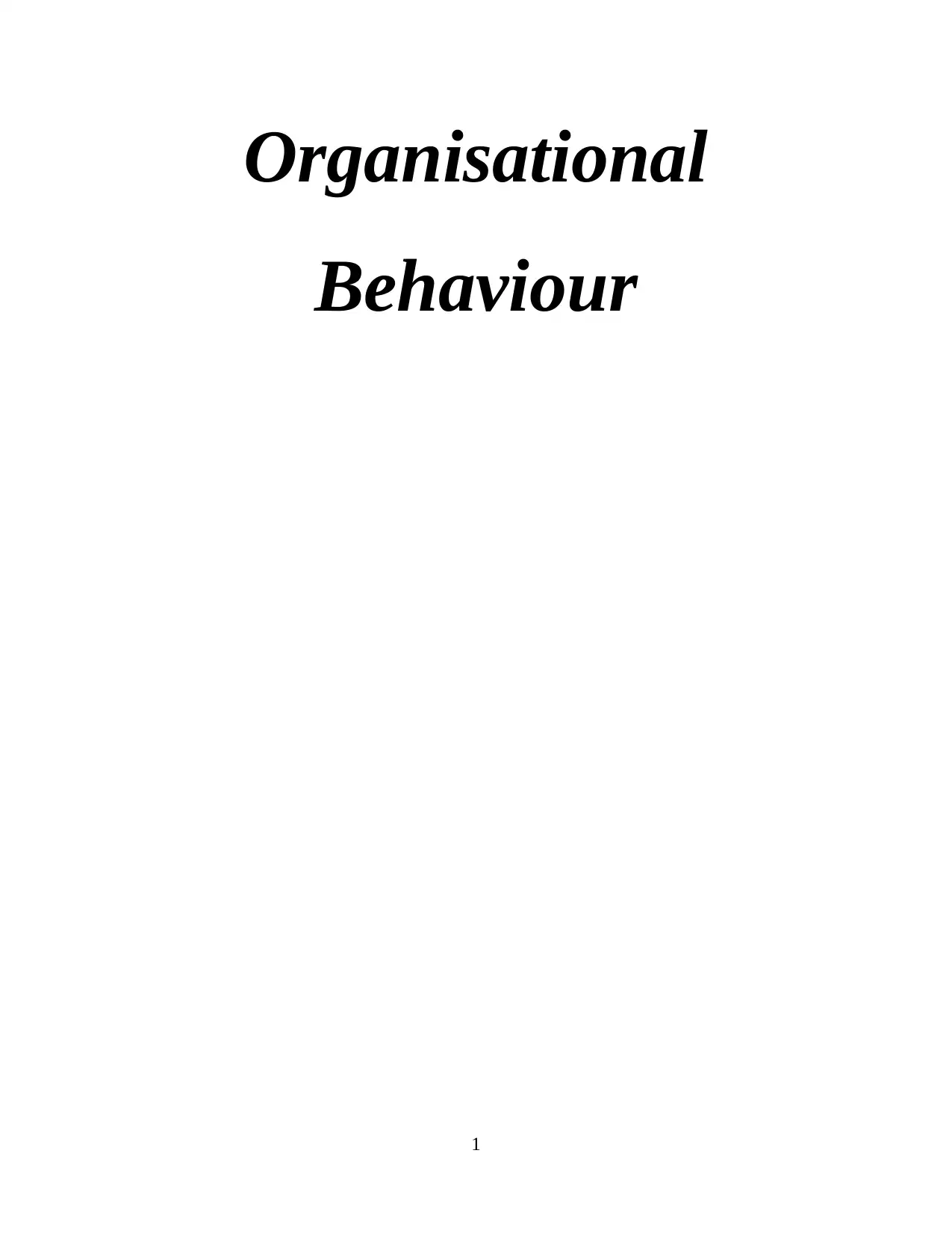
Organisational
Behaviour
1
Behaviour
1
Paraphrase This Document
Need a fresh take? Get an instant paraphrase of this document with our AI Paraphraser
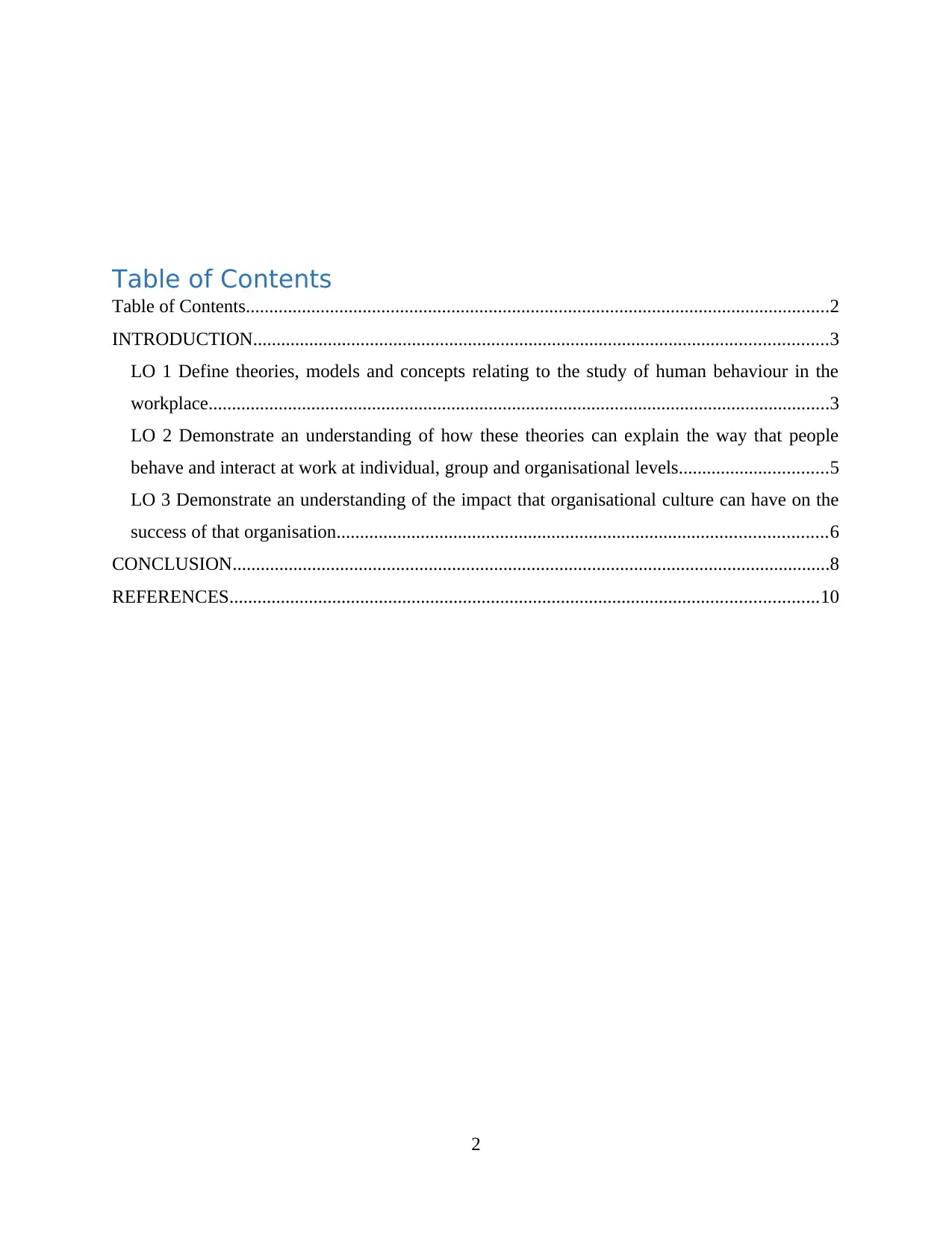
Table of Contents
Table of Contents.............................................................................................................................2
INTRODUCTION...........................................................................................................................3
LO 1 Define theories, models and concepts relating to the study of human behaviour in the
workplace.....................................................................................................................................3
LO 2 Demonstrate an understanding of how these theories can explain the way that people
behave and interact at work at individual, group and organisational levels................................5
LO 3 Demonstrate an understanding of the impact that organisational culture can have on the
success of that organisation.........................................................................................................6
CONCLUSION................................................................................................................................8
REFERENCES..............................................................................................................................10
2
Table of Contents.............................................................................................................................2
INTRODUCTION...........................................................................................................................3
LO 1 Define theories, models and concepts relating to the study of human behaviour in the
workplace.....................................................................................................................................3
LO 2 Demonstrate an understanding of how these theories can explain the way that people
behave and interact at work at individual, group and organisational levels................................5
LO 3 Demonstrate an understanding of the impact that organisational culture can have on the
success of that organisation.........................................................................................................6
CONCLUSION................................................................................................................................8
REFERENCES..............................................................................................................................10
2
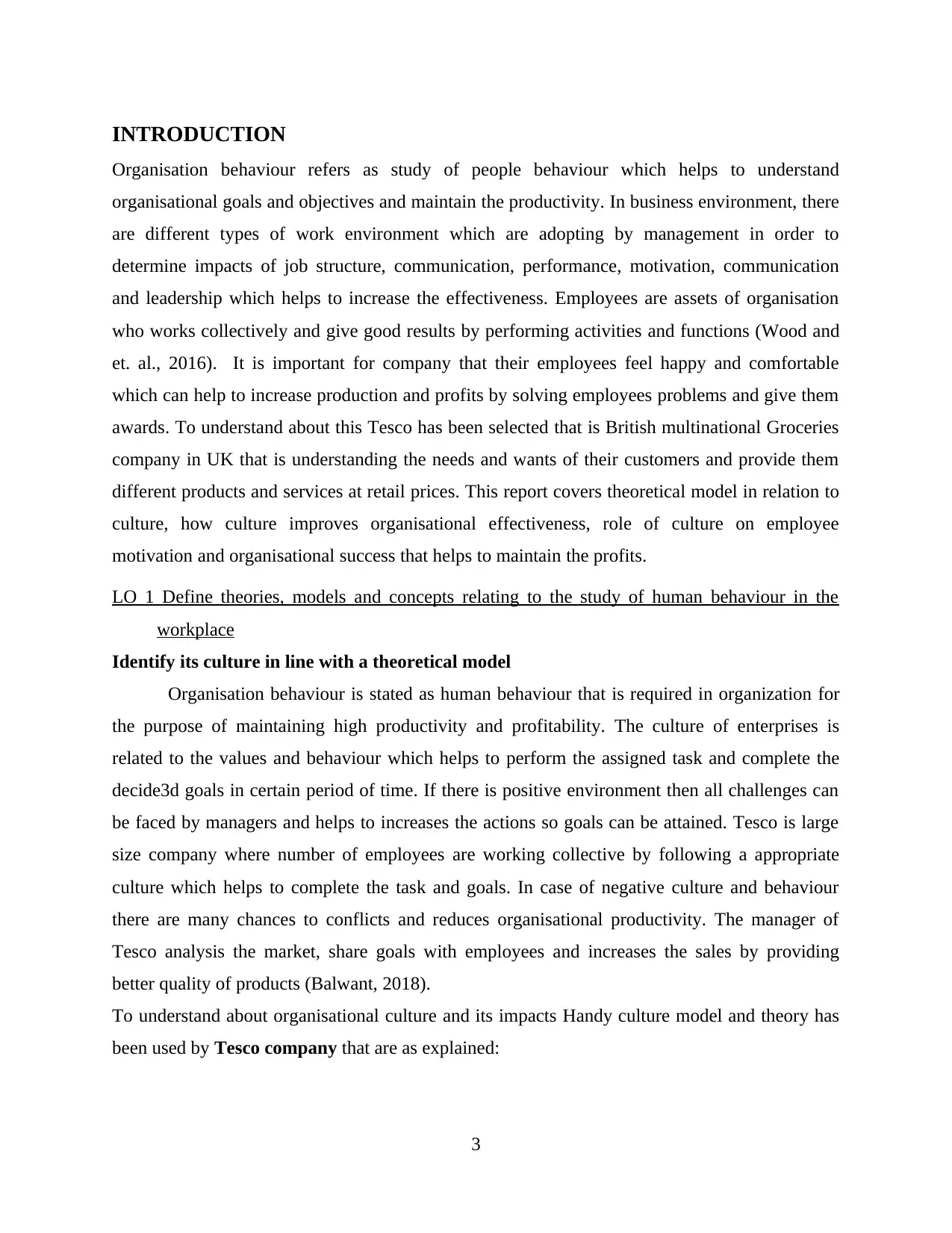
INTRODUCTION
Organisation behaviour refers as study of people behaviour which helps to understand
organisational goals and objectives and maintain the productivity. In business environment, there
are different types of work environment which are adopting by management in order to
determine impacts of job structure, communication, performance, motivation, communication
and leadership which helps to increase the effectiveness. Employees are assets of organisation
who works collectively and give good results by performing activities and functions (Wood and
et. al., 2016). It is important for company that their employees feel happy and comfortable
which can help to increase production and profits by solving employees problems and give them
awards. To understand about this Tesco has been selected that is British multinational Groceries
company in UK that is understanding the needs and wants of their customers and provide them
different products and services at retail prices. This report covers theoretical model in relation to
culture, how culture improves organisational effectiveness, role of culture on employee
motivation and organisational success that helps to maintain the profits.
LO 1 Define theories, models and concepts relating to the study of human behaviour in the
workplace
Identify its culture in line with a theoretical model
Organisation behaviour is stated as human behaviour that is required in organization for
the purpose of maintaining high productivity and profitability. The culture of enterprises is
related to the values and behaviour which helps to perform the assigned task and complete the
decide3d goals in certain period of time. If there is positive environment then all challenges can
be faced by managers and helps to increases the actions so goals can be attained. Tesco is large
size company where number of employees are working collective by following a appropriate
culture which helps to complete the task and goals. In case of negative culture and behaviour
there are many chances to conflicts and reduces organisational productivity. The manager of
Tesco analysis the market, share goals with employees and increases the sales by providing
better quality of products (Balwant, 2018).
To understand about organisational culture and its impacts Handy culture model and theory has
been used by Tesco company that are as explained:
3
Organisation behaviour refers as study of people behaviour which helps to understand
organisational goals and objectives and maintain the productivity. In business environment, there
are different types of work environment which are adopting by management in order to
determine impacts of job structure, communication, performance, motivation, communication
and leadership which helps to increase the effectiveness. Employees are assets of organisation
who works collectively and give good results by performing activities and functions (Wood and
et. al., 2016). It is important for company that their employees feel happy and comfortable
which can help to increase production and profits by solving employees problems and give them
awards. To understand about this Tesco has been selected that is British multinational Groceries
company in UK that is understanding the needs and wants of their customers and provide them
different products and services at retail prices. This report covers theoretical model in relation to
culture, how culture improves organisational effectiveness, role of culture on employee
motivation and organisational success that helps to maintain the profits.
LO 1 Define theories, models and concepts relating to the study of human behaviour in the
workplace
Identify its culture in line with a theoretical model
Organisation behaviour is stated as human behaviour that is required in organization for
the purpose of maintaining high productivity and profitability. The culture of enterprises is
related to the values and behaviour which helps to perform the assigned task and complete the
decide3d goals in certain period of time. If there is positive environment then all challenges can
be faced by managers and helps to increases the actions so goals can be attained. Tesco is large
size company where number of employees are working collective by following a appropriate
culture which helps to complete the task and goals. In case of negative culture and behaviour
there are many chances to conflicts and reduces organisational productivity. The manager of
Tesco analysis the market, share goals with employees and increases the sales by providing
better quality of products (Balwant, 2018).
To understand about organisational culture and its impacts Handy culture model and theory has
been used by Tesco company that are as explained:
3
⊘ This is a preview!⊘
Do you want full access?
Subscribe today to unlock all pages.

Trusted by 1+ million students worldwide
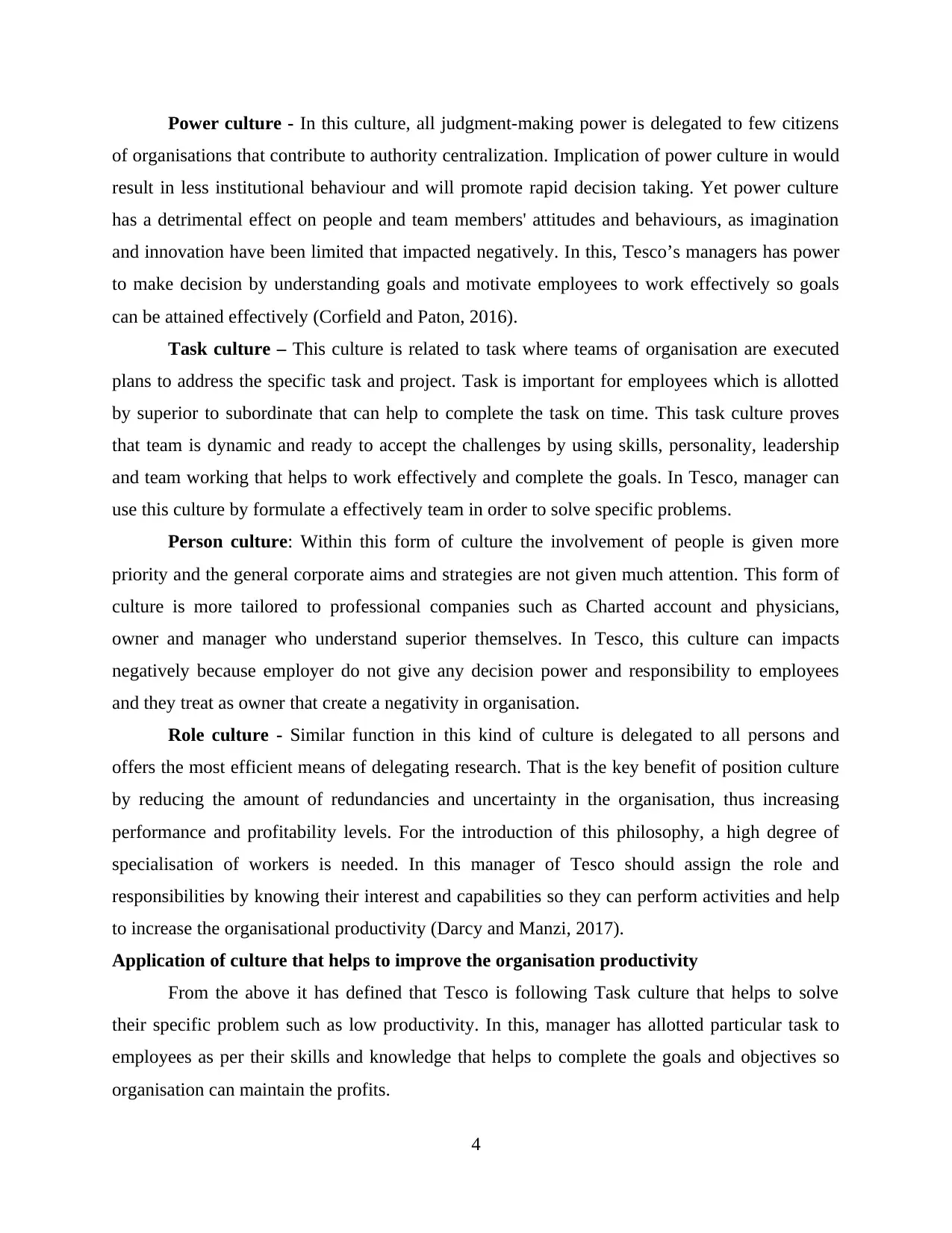
Power culture - In this culture, all judgment-making power is delegated to few citizens
of organisations that contribute to authority centralization. Implication of power culture in would
result in less institutional behaviour and will promote rapid decision taking. Yet power culture
has a detrimental effect on people and team members' attitudes and behaviours, as imagination
and innovation have been limited that impacted negatively. In this, Tesco’s managers has power
to make decision by understanding goals and motivate employees to work effectively so goals
can be attained effectively (Corfield and Paton, 2016).
Task culture – This culture is related to task where teams of organisation are executed
plans to address the specific task and project. Task is important for employees which is allotted
by superior to subordinate that can help to complete the task on time. This task culture proves
that team is dynamic and ready to accept the challenges by using skills, personality, leadership
and team working that helps to work effectively and complete the goals. In Tesco, manager can
use this culture by formulate a effectively team in order to solve specific problems.
Person culture: Within this form of culture the involvement of people is given more
priority and the general corporate aims and strategies are not given much attention. This form of
culture is more tailored to professional companies such as Charted account and physicians,
owner and manager who understand superior themselves. In Tesco, this culture can impacts
negatively because employer do not give any decision power and responsibility to employees
and they treat as owner that create a negativity in organisation.
Role culture - Similar function in this kind of culture is delegated to all persons and
offers the most efficient means of delegating research. That is the key benefit of position culture
by reducing the amount of redundancies and uncertainty in the organisation, thus increasing
performance and profitability levels. For the introduction of this philosophy, a high degree of
specialisation of workers is needed. In this manager of Tesco should assign the role and
responsibilities by knowing their interest and capabilities so they can perform activities and help
to increase the organisational productivity (Darcy and Manzi, 2017).
Application of culture that helps to improve the organisation productivity
From the above it has defined that Tesco is following Task culture that helps to solve
their specific problem such as low productivity. In this, manager has allotted particular task to
employees as per their skills and knowledge that helps to complete the goals and objectives so
organisation can maintain the profits.
4
of organisations that contribute to authority centralization. Implication of power culture in would
result in less institutional behaviour and will promote rapid decision taking. Yet power culture
has a detrimental effect on people and team members' attitudes and behaviours, as imagination
and innovation have been limited that impacted negatively. In this, Tesco’s managers has power
to make decision by understanding goals and motivate employees to work effectively so goals
can be attained effectively (Corfield and Paton, 2016).
Task culture – This culture is related to task where teams of organisation are executed
plans to address the specific task and project. Task is important for employees which is allotted
by superior to subordinate that can help to complete the task on time. This task culture proves
that team is dynamic and ready to accept the challenges by using skills, personality, leadership
and team working that helps to work effectively and complete the goals. In Tesco, manager can
use this culture by formulate a effectively team in order to solve specific problems.
Person culture: Within this form of culture the involvement of people is given more
priority and the general corporate aims and strategies are not given much attention. This form of
culture is more tailored to professional companies such as Charted account and physicians,
owner and manager who understand superior themselves. In Tesco, this culture can impacts
negatively because employer do not give any decision power and responsibility to employees
and they treat as owner that create a negativity in organisation.
Role culture - Similar function in this kind of culture is delegated to all persons and
offers the most efficient means of delegating research. That is the key benefit of position culture
by reducing the amount of redundancies and uncertainty in the organisation, thus increasing
performance and profitability levels. For the introduction of this philosophy, a high degree of
specialisation of workers is needed. In this manager of Tesco should assign the role and
responsibilities by knowing their interest and capabilities so they can perform activities and help
to increase the organisational productivity (Darcy and Manzi, 2017).
Application of culture that helps to improve the organisation productivity
From the above it has defined that Tesco is following Task culture that helps to solve
their specific problem such as low productivity. In this, manager has allotted particular task to
employees as per their skills and knowledge that helps to complete the goals and objectives so
organisation can maintain the profits.
4
Paraphrase This Document
Need a fresh take? Get an instant paraphrase of this document with our AI Paraphraser
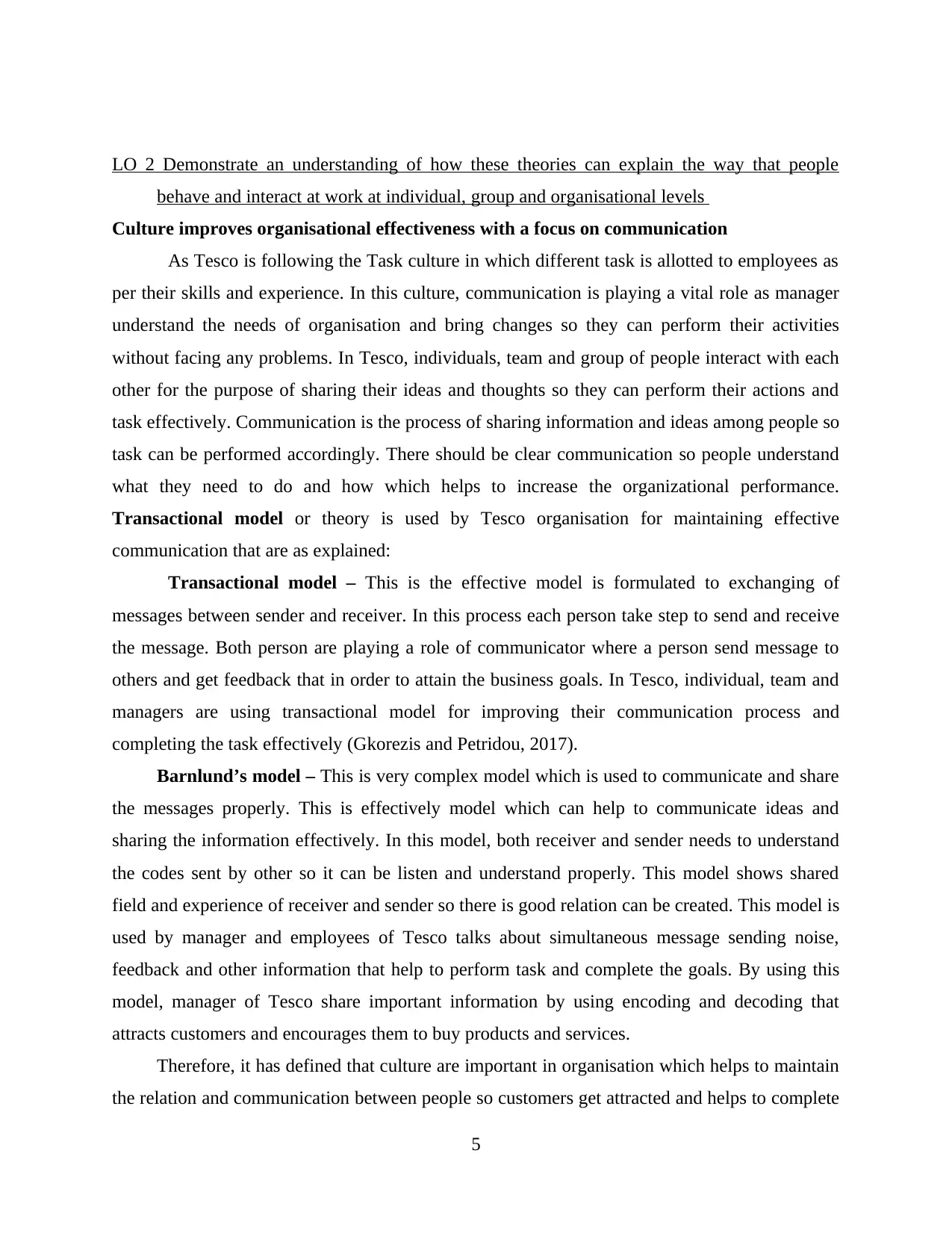
LO 2 Demonstrate an understanding of how these theories can explain the way that people
behave and interact at work at individual, group and organisational levels
Culture improves organisational effectiveness with a focus on communication
As Tesco is following the Task culture in which different task is allotted to employees as
per their skills and experience. In this culture, communication is playing a vital role as manager
understand the needs of organisation and bring changes so they can perform their activities
without facing any problems. In Tesco, individuals, team and group of people interact with each
other for the purpose of sharing their ideas and thoughts so they can perform their actions and
task effectively. Communication is the process of sharing information and ideas among people so
task can be performed accordingly. There should be clear communication so people understand
what they need to do and how which helps to increase the organizational performance.
Transactional model or theory is used by Tesco organisation for maintaining effective
communication that are as explained:
Transactional model – This is the effective model is formulated to exchanging of
messages between sender and receiver. In this process each person take step to send and receive
the message. Both person are playing a role of communicator where a person send message to
others and get feedback that in order to attain the business goals. In Tesco, individual, team and
managers are using transactional model for improving their communication process and
completing the task effectively (Gkorezis and Petridou, 2017).
Barnlund’s model – This is very complex model which is used to communicate and share
the messages properly. This is effectively model which can help to communicate ideas and
sharing the information effectively. In this model, both receiver and sender needs to understand
the codes sent by other so it can be listen and understand properly. This model shows shared
field and experience of receiver and sender so there is good relation can be created. This model is
used by manager and employees of Tesco talks about simultaneous message sending noise,
feedback and other information that help to perform task and complete the goals. By using this
model, manager of Tesco share important information by using encoding and decoding that
attracts customers and encourages them to buy products and services.
Therefore, it has defined that culture are important in organisation which helps to maintain
the relation and communication between people so customers get attracted and helps to complete
5
behave and interact at work at individual, group and organisational levels
Culture improves organisational effectiveness with a focus on communication
As Tesco is following the Task culture in which different task is allotted to employees as
per their skills and experience. In this culture, communication is playing a vital role as manager
understand the needs of organisation and bring changes so they can perform their activities
without facing any problems. In Tesco, individuals, team and group of people interact with each
other for the purpose of sharing their ideas and thoughts so they can perform their actions and
task effectively. Communication is the process of sharing information and ideas among people so
task can be performed accordingly. There should be clear communication so people understand
what they need to do and how which helps to increase the organizational performance.
Transactional model or theory is used by Tesco organisation for maintaining effective
communication that are as explained:
Transactional model – This is the effective model is formulated to exchanging of
messages between sender and receiver. In this process each person take step to send and receive
the message. Both person are playing a role of communicator where a person send message to
others and get feedback that in order to attain the business goals. In Tesco, individual, team and
managers are using transactional model for improving their communication process and
completing the task effectively (Gkorezis and Petridou, 2017).
Barnlund’s model – This is very complex model which is used to communicate and share
the messages properly. This is effectively model which can help to communicate ideas and
sharing the information effectively. In this model, both receiver and sender needs to understand
the codes sent by other so it can be listen and understand properly. This model shows shared
field and experience of receiver and sender so there is good relation can be created. This model is
used by manager and employees of Tesco talks about simultaneous message sending noise,
feedback and other information that help to perform task and complete the goals. By using this
model, manager of Tesco share important information by using encoding and decoding that
attracts customers and encourages them to buy products and services.
Therefore, it has defined that culture are important in organisation which helps to maintain
the relation and communication between people so customers get attracted and helps to complete
5
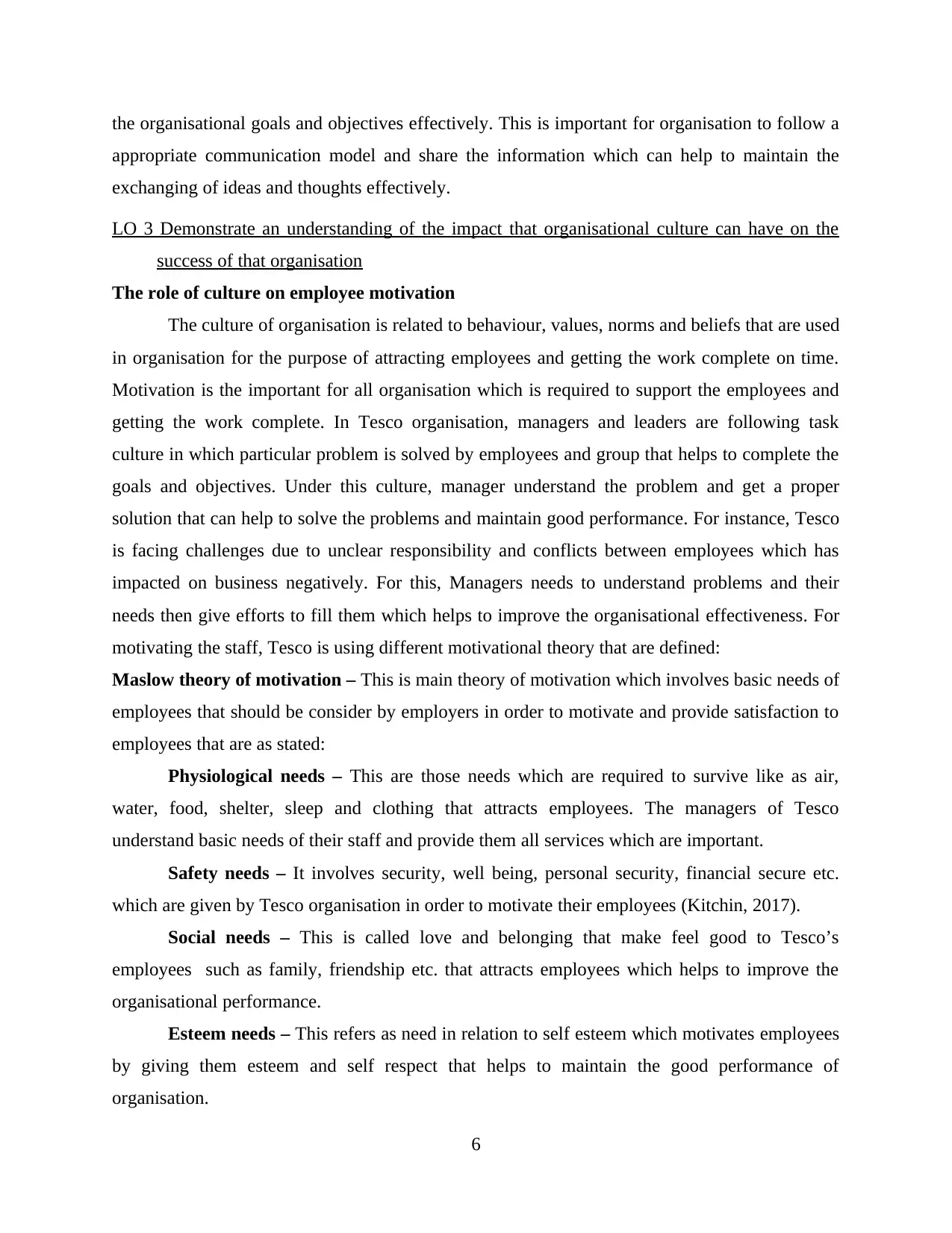
the organisational goals and objectives effectively. This is important for organisation to follow a
appropriate communication model and share the information which can help to maintain the
exchanging of ideas and thoughts effectively.
LO 3 Demonstrate an understanding of the impact that organisational culture can have on the
success of that organisation
The role of culture on employee motivation
The culture of organisation is related to behaviour, values, norms and beliefs that are used
in organisation for the purpose of attracting employees and getting the work complete on time.
Motivation is the important for all organisation which is required to support the employees and
getting the work complete. In Tesco organisation, managers and leaders are following task
culture in which particular problem is solved by employees and group that helps to complete the
goals and objectives. Under this culture, manager understand the problem and get a proper
solution that can help to solve the problems and maintain good performance. For instance, Tesco
is facing challenges due to unclear responsibility and conflicts between employees which has
impacted on business negatively. For this, Managers needs to understand problems and their
needs then give efforts to fill them which helps to improve the organisational effectiveness. For
motivating the staff, Tesco is using different motivational theory that are defined:
Maslow theory of motivation – This is main theory of motivation which involves basic needs of
employees that should be consider by employers in order to motivate and provide satisfaction to
employees that are as stated:
Physiological needs – This are those needs which are required to survive like as air,
water, food, shelter, sleep and clothing that attracts employees. The managers of Tesco
understand basic needs of their staff and provide them all services which are important.
Safety needs – It involves security, well being, personal security, financial secure etc.
which are given by Tesco organisation in order to motivate their employees (Kitchin, 2017).
Social needs – This is called love and belonging that make feel good to Tesco’s
employees such as family, friendship etc. that attracts employees which helps to improve the
organisational performance.
Esteem needs – This refers as need in relation to self esteem which motivates employees
by giving them esteem and self respect that helps to maintain the good performance of
organisation.
6
appropriate communication model and share the information which can help to maintain the
exchanging of ideas and thoughts effectively.
LO 3 Demonstrate an understanding of the impact that organisational culture can have on the
success of that organisation
The role of culture on employee motivation
The culture of organisation is related to behaviour, values, norms and beliefs that are used
in organisation for the purpose of attracting employees and getting the work complete on time.
Motivation is the important for all organisation which is required to support the employees and
getting the work complete. In Tesco organisation, managers and leaders are following task
culture in which particular problem is solved by employees and group that helps to complete the
goals and objectives. Under this culture, manager understand the problem and get a proper
solution that can help to solve the problems and maintain good performance. For instance, Tesco
is facing challenges due to unclear responsibility and conflicts between employees which has
impacted on business negatively. For this, Managers needs to understand problems and their
needs then give efforts to fill them which helps to improve the organisational effectiveness. For
motivating the staff, Tesco is using different motivational theory that are defined:
Maslow theory of motivation – This is main theory of motivation which involves basic needs of
employees that should be consider by employers in order to motivate and provide satisfaction to
employees that are as stated:
Physiological needs – This are those needs which are required to survive like as air,
water, food, shelter, sleep and clothing that attracts employees. The managers of Tesco
understand basic needs of their staff and provide them all services which are important.
Safety needs – It involves security, well being, personal security, financial secure etc.
which are given by Tesco organisation in order to motivate their employees (Kitchin, 2017).
Social needs – This is called love and belonging that make feel good to Tesco’s
employees such as family, friendship etc. that attracts employees which helps to improve the
organisational performance.
Esteem needs – This refers as need in relation to self esteem which motivates employees
by giving them esteem and self respect that helps to maintain the good performance of
organisation.
6
⊘ This is a preview!⊘
Do you want full access?
Subscribe today to unlock all pages.

Trusted by 1+ million students worldwide
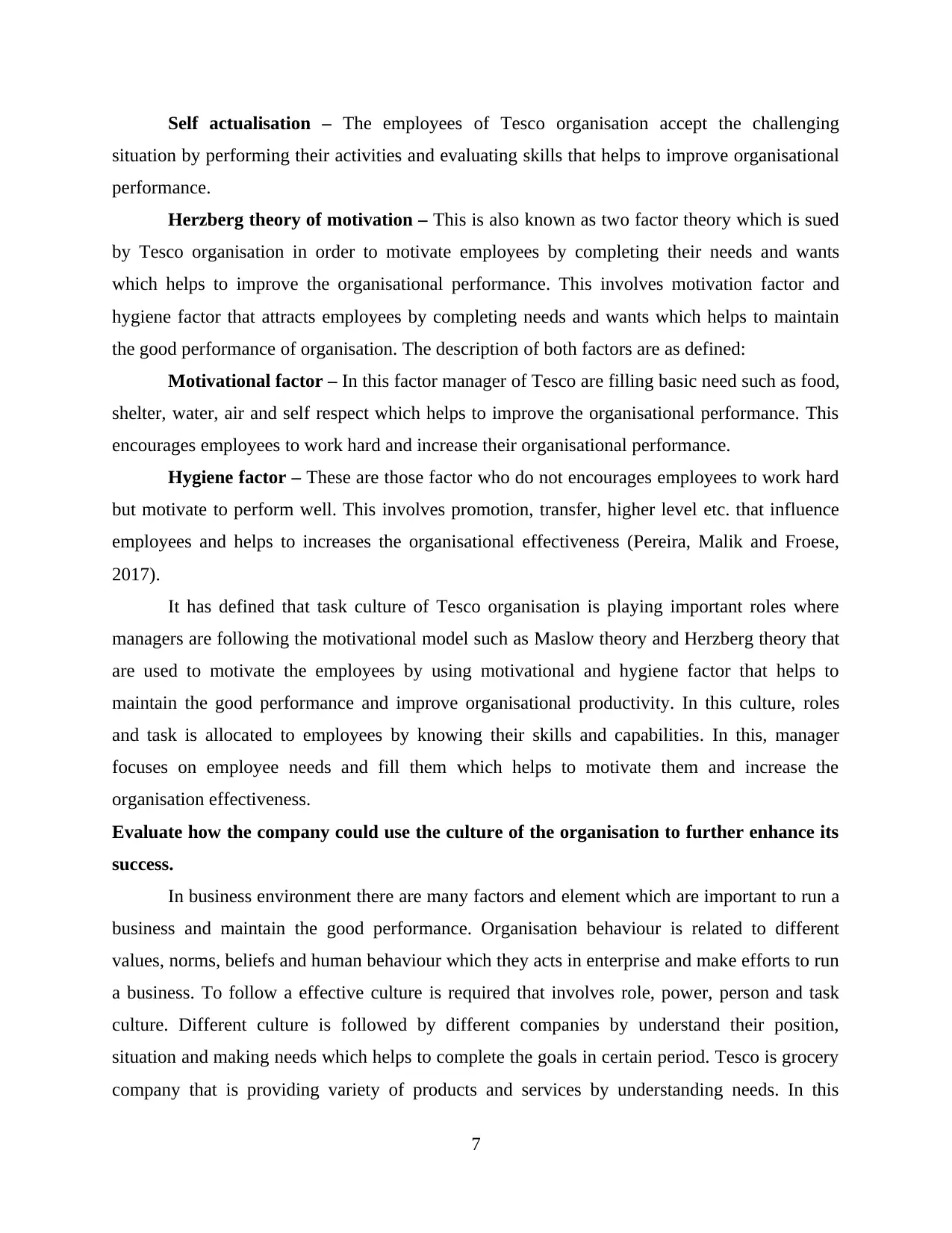
Self actualisation – The employees of Tesco organisation accept the challenging
situation by performing their activities and evaluating skills that helps to improve organisational
performance.
Herzberg theory of motivation – This is also known as two factor theory which is sued
by Tesco organisation in order to motivate employees by completing their needs and wants
which helps to improve the organisational performance. This involves motivation factor and
hygiene factor that attracts employees by completing needs and wants which helps to maintain
the good performance of organisation. The description of both factors are as defined:
Motivational factor – In this factor manager of Tesco are filling basic need such as food,
shelter, water, air and self respect which helps to improve the organisational performance. This
encourages employees to work hard and increase their organisational performance.
Hygiene factor – These are those factor who do not encourages employees to work hard
but motivate to perform well. This involves promotion, transfer, higher level etc. that influence
employees and helps to increases the organisational effectiveness (Pereira, Malik and Froese,
2017).
It has defined that task culture of Tesco organisation is playing important roles where
managers are following the motivational model such as Maslow theory and Herzberg theory that
are used to motivate the employees by using motivational and hygiene factor that helps to
maintain the good performance and improve organisational productivity. In this culture, roles
and task is allocated to employees by knowing their skills and capabilities. In this, manager
focuses on employee needs and fill them which helps to motivate them and increase the
organisation effectiveness.
Evaluate how the company could use the culture of the organisation to further enhance its
success.
In business environment there are many factors and element which are important to run a
business and maintain the good performance. Organisation behaviour is related to different
values, norms, beliefs and human behaviour which they acts in enterprise and make efforts to run
a business. To follow a effective culture is required that involves role, power, person and task
culture. Different culture is followed by different companies by understand their position,
situation and making needs which helps to complete the goals in certain period. Tesco is grocery
company that is providing variety of products and services by understanding needs. In this
7
situation by performing their activities and evaluating skills that helps to improve organisational
performance.
Herzberg theory of motivation – This is also known as two factor theory which is sued
by Tesco organisation in order to motivate employees by completing their needs and wants
which helps to improve the organisational performance. This involves motivation factor and
hygiene factor that attracts employees by completing needs and wants which helps to maintain
the good performance of organisation. The description of both factors are as defined:
Motivational factor – In this factor manager of Tesco are filling basic need such as food,
shelter, water, air and self respect which helps to improve the organisational performance. This
encourages employees to work hard and increase their organisational performance.
Hygiene factor – These are those factor who do not encourages employees to work hard
but motivate to perform well. This involves promotion, transfer, higher level etc. that influence
employees and helps to increases the organisational effectiveness (Pereira, Malik and Froese,
2017).
It has defined that task culture of Tesco organisation is playing important roles where
managers are following the motivational model such as Maslow theory and Herzberg theory that
are used to motivate the employees by using motivational and hygiene factor that helps to
maintain the good performance and improve organisational productivity. In this culture, roles
and task is allocated to employees by knowing their skills and capabilities. In this, manager
focuses on employee needs and fill them which helps to motivate them and increase the
organisation effectiveness.
Evaluate how the company could use the culture of the organisation to further enhance its
success.
In business environment there are many factors and element which are important to run a
business and maintain the good performance. Organisation behaviour is related to different
values, norms, beliefs and human behaviour which they acts in enterprise and make efforts to run
a business. To follow a effective culture is required that involves role, power, person and task
culture. Different culture is followed by different companies by understand their position,
situation and making needs which helps to complete the goals in certain period. Tesco is grocery
company that is providing variety of products and services by understanding needs. In this
7
Paraphrase This Document
Need a fresh take? Get an instant paraphrase of this document with our AI Paraphraser
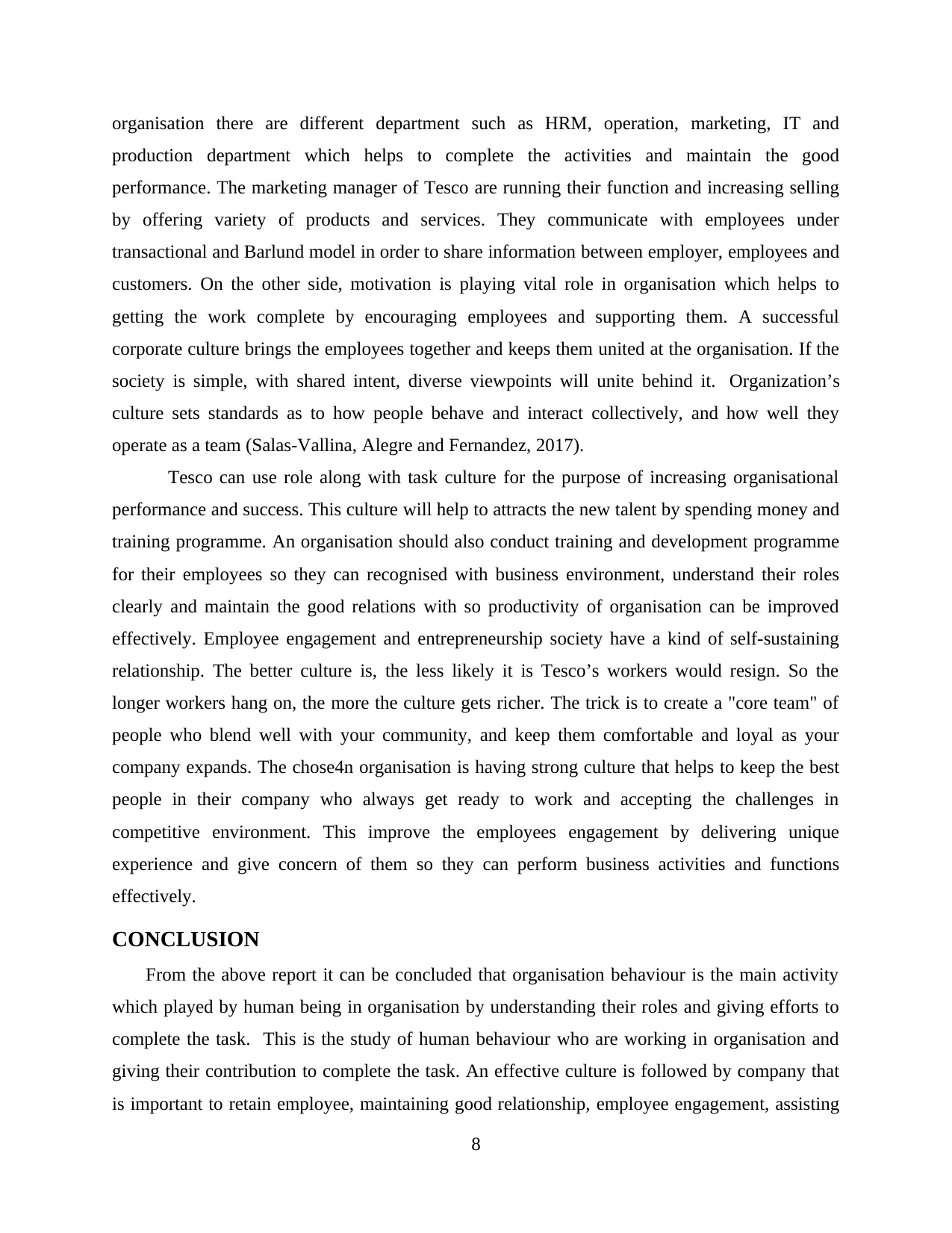
organisation there are different department such as HRM, operation, marketing, IT and
production department which helps to complete the activities and maintain the good
performance. The marketing manager of Tesco are running their function and increasing selling
by offering variety of products and services. They communicate with employees under
transactional and Barlund model in order to share information between employer, employees and
customers. On the other side, motivation is playing vital role in organisation which helps to
getting the work complete by encouraging employees and supporting them. A successful
corporate culture brings the employees together and keeps them united at the organisation. If the
society is simple, with shared intent, diverse viewpoints will unite behind it. Organization’s
culture sets standards as to how people behave and interact collectively, and how well they
operate as a team (Salas-Vallina, Alegre and Fernandez, 2017).
Tesco can use role along with task culture for the purpose of increasing organisational
performance and success. This culture will help to attracts the new talent by spending money and
training programme. An organisation should also conduct training and development programme
for their employees so they can recognised with business environment, understand their roles
clearly and maintain the good relations with so productivity of organisation can be improved
effectively. Employee engagement and entrepreneurship society have a kind of self-sustaining
relationship. The better culture is, the less likely it is Tesco’s workers would resign. So the
longer workers hang on, the more the culture gets richer. The trick is to create a "core team" of
people who blend well with your community, and keep them comfortable and loyal as your
company expands. The chose4n organisation is having strong culture that helps to keep the best
people in their company who always get ready to work and accepting the challenges in
competitive environment. This improve the employees engagement by delivering unique
experience and give concern of them so they can perform business activities and functions
effectively.
CONCLUSION
From the above report it can be concluded that organisation behaviour is the main activity
which played by human being in organisation by understanding their roles and giving efforts to
complete the task. This is the study of human behaviour who are working in organisation and
giving their contribution to complete the task. An effective culture is followed by company that
is important to retain employee, maintaining good relationship, employee engagement, assisting
8
production department which helps to complete the activities and maintain the good
performance. The marketing manager of Tesco are running their function and increasing selling
by offering variety of products and services. They communicate with employees under
transactional and Barlund model in order to share information between employer, employees and
customers. On the other side, motivation is playing vital role in organisation which helps to
getting the work complete by encouraging employees and supporting them. A successful
corporate culture brings the employees together and keeps them united at the organisation. If the
society is simple, with shared intent, diverse viewpoints will unite behind it. Organization’s
culture sets standards as to how people behave and interact collectively, and how well they
operate as a team (Salas-Vallina, Alegre and Fernandez, 2017).
Tesco can use role along with task culture for the purpose of increasing organisational
performance and success. This culture will help to attracts the new talent by spending money and
training programme. An organisation should also conduct training and development programme
for their employees so they can recognised with business environment, understand their roles
clearly and maintain the good relations with so productivity of organisation can be improved
effectively. Employee engagement and entrepreneurship society have a kind of self-sustaining
relationship. The better culture is, the less likely it is Tesco’s workers would resign. So the
longer workers hang on, the more the culture gets richer. The trick is to create a "core team" of
people who blend well with your community, and keep them comfortable and loyal as your
company expands. The chose4n organisation is having strong culture that helps to keep the best
people in their company who always get ready to work and accepting the challenges in
competitive environment. This improve the employees engagement by delivering unique
experience and give concern of them so they can perform business activities and functions
effectively.
CONCLUSION
From the above report it can be concluded that organisation behaviour is the main activity
which played by human being in organisation by understanding their roles and giving efforts to
complete the task. This is the study of human behaviour who are working in organisation and
giving their contribution to complete the task. An effective culture is followed by company that
is important to retain employee, maintaining good relationship, employee engagement, assisting
8
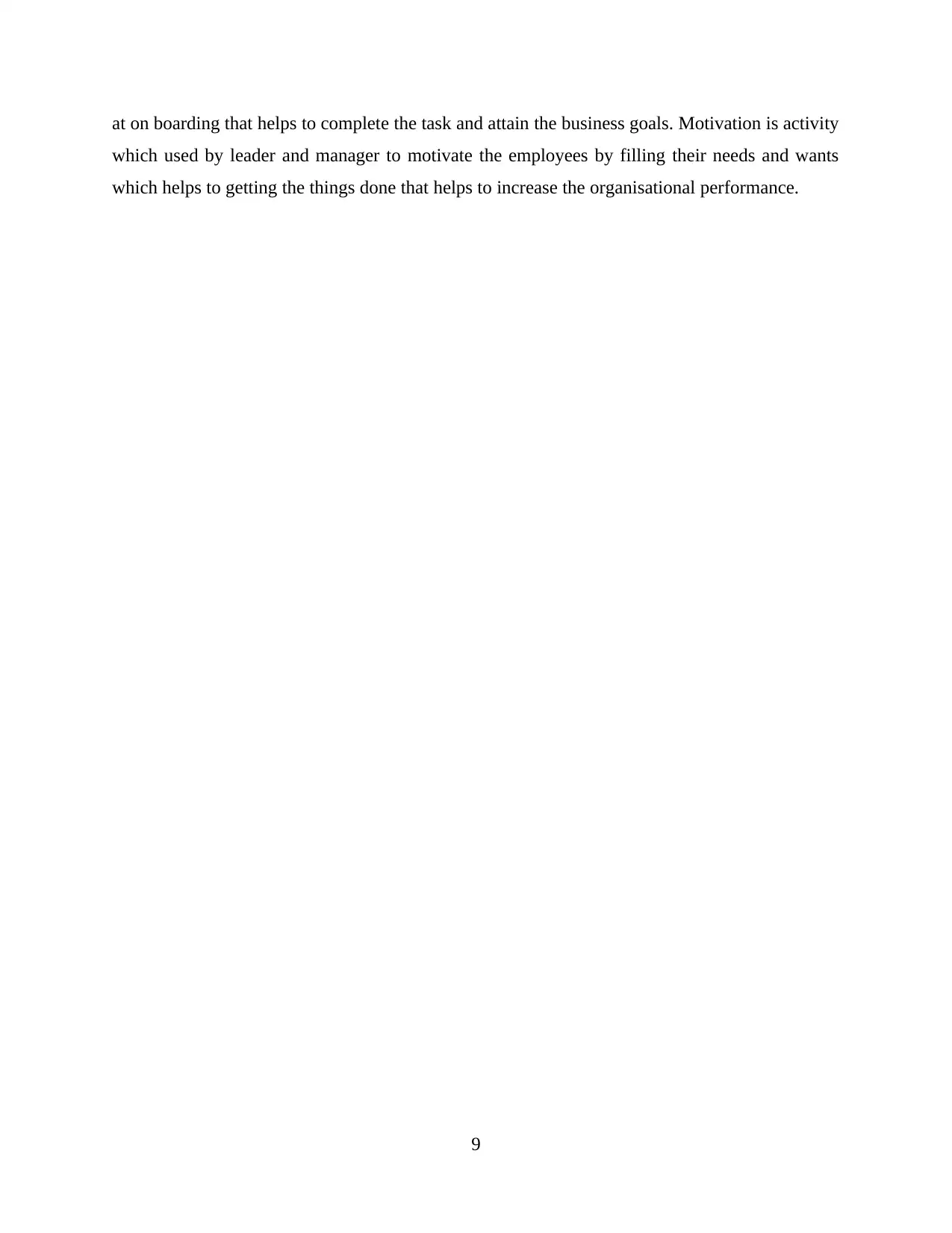
at on boarding that helps to complete the task and attain the business goals. Motivation is activity
which used by leader and manager to motivate the employees by filling their needs and wants
which helps to getting the things done that helps to increase the organisational performance.
9
which used by leader and manager to motivate the employees by filling their needs and wants
which helps to getting the things done that helps to increase the organisational performance.
9
⊘ This is a preview!⊘
Do you want full access?
Subscribe today to unlock all pages.

Trusted by 1+ million students worldwide
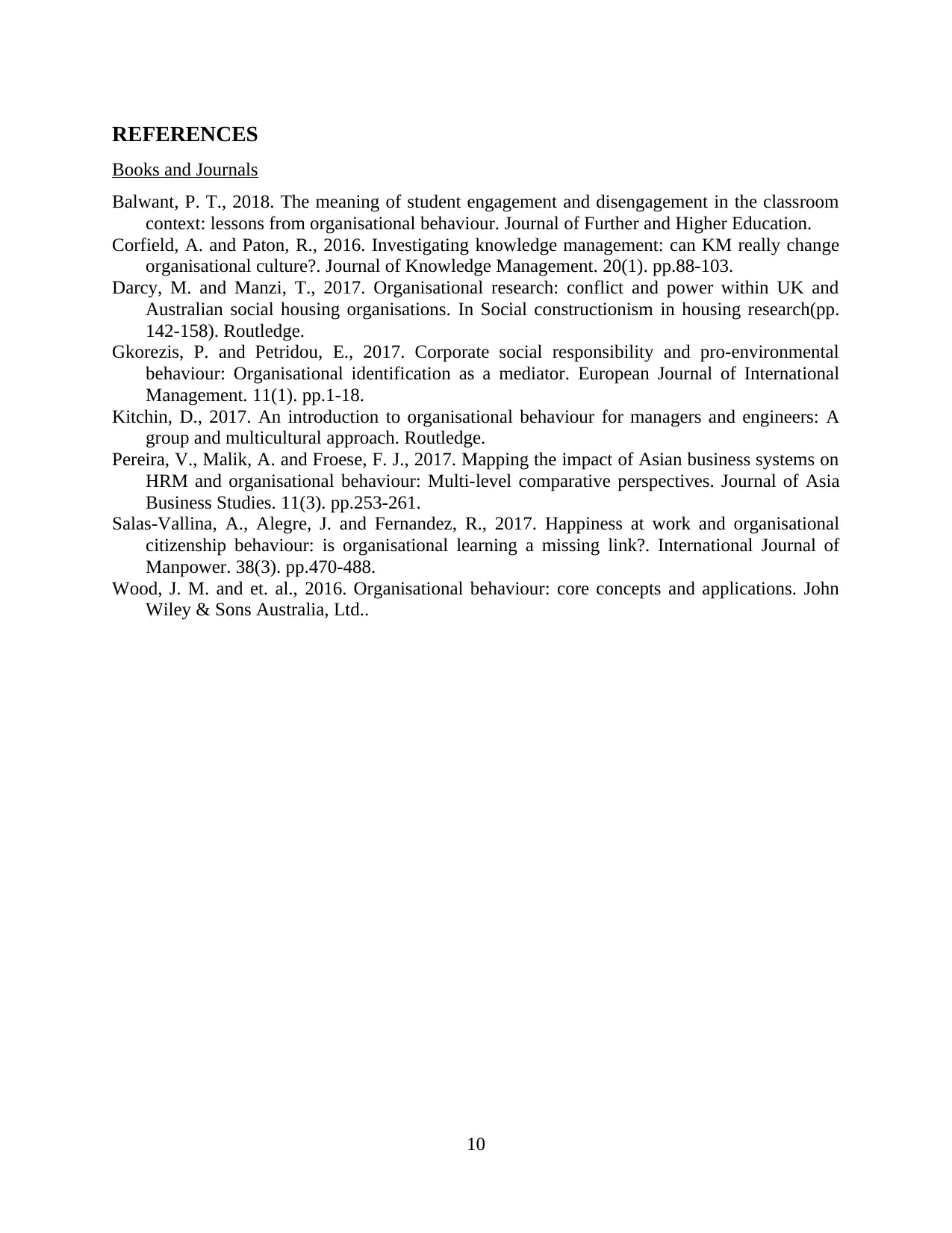
REFERENCES
Books and Journals
Balwant, P. T., 2018. The meaning of student engagement and disengagement in the classroom
context: lessons from organisational behaviour. Journal of Further and Higher Education.
Corfield, A. and Paton, R., 2016. Investigating knowledge management: can KM really change
organisational culture?. Journal of Knowledge Management. 20(1). pp.88-103.
Darcy, M. and Manzi, T., 2017. Organisational research: conflict and power within UK and
Australian social housing organisations. In Social constructionism in housing research(pp.
142-158). Routledge.
Gkorezis, P. and Petridou, E., 2017. Corporate social responsibility and pro-environmental
behaviour: Organisational identification as a mediator. European Journal of International
Management. 11(1). pp.1-18.
Kitchin, D., 2017. An introduction to organisational behaviour for managers and engineers: A
group and multicultural approach. Routledge.
Pereira, V., Malik, A. and Froese, F. J., 2017. Mapping the impact of Asian business systems on
HRM and organisational behaviour: Multi-level comparative perspectives. Journal of Asia
Business Studies. 11(3). pp.253-261.
Salas-Vallina, A., Alegre, J. and Fernandez, R., 2017. Happiness at work and organisational
citizenship behaviour: is organisational learning a missing link?. International Journal of
Manpower. 38(3). pp.470-488.
Wood, J. M. and et. al., 2016. Organisational behaviour: core concepts and applications. John
Wiley & Sons Australia, Ltd..
10
Books and Journals
Balwant, P. T., 2018. The meaning of student engagement and disengagement in the classroom
context: lessons from organisational behaviour. Journal of Further and Higher Education.
Corfield, A. and Paton, R., 2016. Investigating knowledge management: can KM really change
organisational culture?. Journal of Knowledge Management. 20(1). pp.88-103.
Darcy, M. and Manzi, T., 2017. Organisational research: conflict and power within UK and
Australian social housing organisations. In Social constructionism in housing research(pp.
142-158). Routledge.
Gkorezis, P. and Petridou, E., 2017. Corporate social responsibility and pro-environmental
behaviour: Organisational identification as a mediator. European Journal of International
Management. 11(1). pp.1-18.
Kitchin, D., 2017. An introduction to organisational behaviour for managers and engineers: A
group and multicultural approach. Routledge.
Pereira, V., Malik, A. and Froese, F. J., 2017. Mapping the impact of Asian business systems on
HRM and organisational behaviour: Multi-level comparative perspectives. Journal of Asia
Business Studies. 11(3). pp.253-261.
Salas-Vallina, A., Alegre, J. and Fernandez, R., 2017. Happiness at work and organisational
citizenship behaviour: is organisational learning a missing link?. International Journal of
Manpower. 38(3). pp.470-488.
Wood, J. M. and et. al., 2016. Organisational behaviour: core concepts and applications. John
Wiley & Sons Australia, Ltd..
10
1 out of 10
Related Documents
Your All-in-One AI-Powered Toolkit for Academic Success.
+13062052269
info@desklib.com
Available 24*7 on WhatsApp / Email
![[object Object]](/_next/static/media/star-bottom.7253800d.svg)
Unlock your academic potential
Copyright © 2020–2026 A2Z Services. All Rights Reserved. Developed and managed by ZUCOL.





